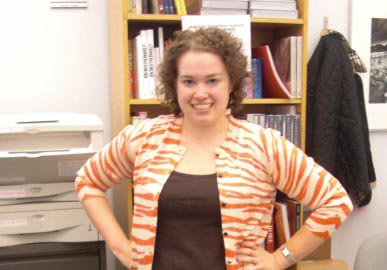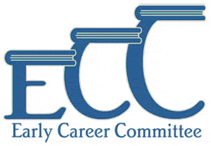
Maggie Maggio, Junior National Accounts Manager, Abrams Books | November 15, 2012

MAGGIE MAGGIO, Junior National Accounts Manager, Abrams Books
How long have you worked at Abrams?
Just over five years.
What was your first job in children’s publishing? How did you come to sales?
I started out as a sales assistant at Abrams Books. I was assisting the sales director who sells to museum shops and also manages Abrams’ distribution clients. I had originally started at Abrams in adult marketing, but I realized that sales was where I wanted to be and when a job opened up I talked to the powers that be and I was able to move over to sales and stay at a company where I really loved the books.
What was the first account you sold to?
I think the first account I sold to on my own was the New York Public Library Shop. Before that I had sat in on various sales calls with other reps.
How did you make the transition from the assistant level to the level of junior manager? Can you share a piece of knowledge you wished you had known while making that transition?
I moved from being a sales assistant to be a sales associate and was still assisting the museum accounts and distribution clients, but I also started handling a few smaller accounts. About six months after that, a job opened up to assist three of our national accounts managers and I started doing that. I kept my smaller accounts and also took over three larger accounts: Hastings, B&N College, and Calendar Club. After a year and a half of doing that job, I was promoted to junior national accounts manager and now handle all of the accounts I handled previously, plus a bunch more, mostly having to do with educational sales.
Can you describe your typical day?
It’s really different every day, there’s no typical day. The main thing I do every day is field questions from accounts over email and phone. Most of them have to do with whether stock is available, how fast we can get them stock, providing tracking on orders that have shipped, or trying to find a fit for a promotion or theme that’s upcoming. I also fill in a lot of grids. Because I deal with educational wholesalers, August is a really busy month because that’s when they start thinking of their catalogs for the next year. I also check orders to make sure accounts are ordering what they should, track POS (point of sale) where I’m able and let accounts know if I think they should buy more, and, of course, learn our lists the best I can so that I am prepared to sell and answer any questions.
What’s the best piece of advice you ever received?
A colleague’s mother once told me that being early to work (my normal MO) was a mistake, and that I should always be a little late so that if one day I’m really late no one will notice — they’ll just rationalize that I’m always a little late and it’s normal.
But seriously, by far the best advice I’ve ever received came from my college student government advisor. I was complaining about how someone had asked for my help and I had agreed to do it, but I already had a full plate before agreeing to help her and now I was even more stressed. My advisor told me that it was my decision to agree to help my colleague and that I couldn’t go back and complain about it. So basically you have to own your decisions and not regret or complain about something that you decided to do in the first place.
What skills do you think are indispensable to working in sales?
Being able to interact with people: if you can’t hold a conversation, or feel nervous being around strangers, sales probably isn’t for you. The ability to think on your feet: I’ve been asked some crazy questions and you have to be able to roll with it. Not minding rejection: sales is all about rejection, you have to realize it’s not personal and that it’s the natural cycle of sales. A good mind for numbers: I’m certainly not a math genius, but if the idea of numbers and math shouldn’t make your head turn. Humility: Ultimately you will spend a lot of your time trying to fix mistakes (yours and other people’s) and listening to people complain to you, if you’re the type that likes to argue back or gets defensive, you’ll probably have issues.
What is one of the worst (it doesn’t have to be the worst) mistake you’ve made? How did you get beyond it?
I assume we’re talking professionally…I honestly don’t know. I’m a pretty type-A personality and I hate disappointing people (myself and others). I feel like if I’ve made a mistake, it’s never been anything major (putting the ISBN for a display on an order rather than for the individual book so the account gets 120 copies rather than 6 copies, for example). There have been other mistakes or oversights along the way, but never anything that really worried me or couldn’t be fixed.
Any funny, interesting, surprising anecdotes (about your own experience or publishing in general) you want to share?
So, so, so many,but none that are appropriate to share in this setting.
What is your favorite word?
It’s like being on Inside the Actor’s Studio! I’ll have to go with fabulous.
What is your favorite industry-related website or blog?
I love BookReporter’s various newsletters. I always find lots of good books to add to my “to-read” list.
What are you reading now? Or what was the last book you really enjoyed?
I have a serious reading problem. I’m currently reading my 92nd book of 2012: Forgotten by Catherine McKenzie. So far so good, but books I’ve read this year that I’ve really, really loved are: Easy by Tammara Webber, Pushing the Limits by Katie McGarry, My Life Next Door by Huntley Fitzpatrick, The Cove by Ron Rash, The Age of Miracles by Karen Walker Thompson, Gone Girl by Gillian Flynn, Silver Linings Playbook by Matthew Quick, The Starboard Sea by Amber Dermont, Rules of Civility by Amor Towles, and The Flight of Gemma Hardy by Margot Livesey.
Recent years have seen a rise in picture-book biographies. Were your life ever to be chronicled in such a way–and don’t be modest, now–who would you choose to illustrate it?
I would pick David Roberts, who illustrated my favorite Abrams picture book, Iggy Peck Architect. I would look retro fabulous.







